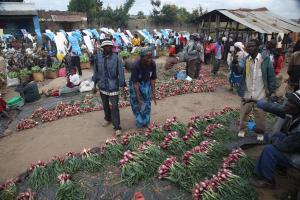First-ever guidelines to help African governments improve food safety in informal food markets to be developed
Continent-wide consultation to begin over new draft guidance to address unique challenges of African food markets, which rely heavily on the informal sector.
NAIROBI, KENYA, June 6, 2024 /EINPresswire.com/ -- New guidelines to support African governments to improve food safety across the continent’s vast informal food sector are set to be developed for the first time.The African Union (AU) and the International Livestock Research Institute (ILRI) have joined forces to produce the first framework for addressing the unique challenges faced by a vital but often overlooked informal food sector.
Africa’s informal sector is critical for food security, employment, and livelihoods, particularly for the continent’s urban poor. Roughly 70 percent of Africa’s urban households buy food from informal markets, which includes street vendors, kiosks, and traditional market sellers, among others.
However, food safety in Africa’s domestic markets, including informal markets, has been historically neglected, or mismanaged. Some 90 million Africans become sick from foodborne illness every year, costing an estimated US$16 billion in productivity losses. In comparison, the international community invests just US$55 million per year in food safety projects on the continent.
The new guidelines seek to reflect the realities of African food systems to improve the ways in which African governments engage with the informal sector in their efforts to improve the safety of foods. Embracing and engaging with the informal food sector as a cornerstone of food systems transformation is likely to play a key role in the post-Malabo agenda.
“Food and nutrition security is a human right, and yet unsafe food undermines this right for millions of Africans every year,” said John Oppong-Otoo, Food Safety Officer, African Union International Bureau for Animal Resources (AU-IBAR).
“We believe these new guidelines will provide realistic and practical guidance to help governments work with the informal sector and gradually transform it to safely and sustainably sustain the population.”
The draft guidelines have been developed following the AU’s continental-wide Food Safety Strategy for Africa, published in 2021 to encourage improvements in food safety management.
While compliance with food safety standards has improved in Africa’s exported goods, progress has been limited when it comes to the domestic informal sector, which is typically fragmented and under-resourced.
“Western approaches to improving food safety, which include compliance with strict requirements and involve complex documentation processes, are really only suited to the formal sector, which is regularised and has sufficient financial resources,” said Silvia Alonso, Senior Scientist Epidemiologist, International Livestock Research Institute (ILRI).
“The reality is most African consumers buy food from the informal sector, which requires different approaches for food safety management. With the right support, governments can unlock the informal food sector as a vehicle for healthy and safe foods for all, and a source of decent and dignified employment for men and women, especially youth, in Africa.”
The guidelines are informed by ILRI’s research and interventions for improved food safety across Africa. This has included a “push-pull” approach in Burkina Faso, which involved both food hygiene training for chicken grillers as well as awareness campaigns for consumers, and inclusive professionalization of the informal milk sector in Kenya through training and marketing.
The AU and ILRI will consult with informal sector actors and partners to help refine the guidelines from June 10. The consultation process with member states will continue throughout 2024 and 2025 before the framework is scheduled to be presented to the AU policy bodies for approval in 2025.
ENDS
Notes to editors
For further information or interview requests, contact:
Donna Bowater
Marchmont Communications
donna@marchmontcomms.com
+61 434 634 099
Matthew Stafford
Marchmont Communications
matthew@marchmontcomms.com
+44 7788 863692
About the International Livestock Research Institute (ILRI)
The International Livestock Research Institute (ILRI) works to improve food and nutritional security and reduce poverty in developing countries through research for efficient, safe, and sustainable use of livestock. ILRI is a member of the CGIAR System Organization, a global research partnership for a food-secure future.
About the African Union – InterAfrican Bureau for Animal Resources (AU-IBAR)
The African Union - InterAfrican Bureau for Animal Resources (AU-IBAR) supports and coordinates the utilization of animals (livestock, fisheries and wildlife) as a resource for human wellbeing in the Member States of the African Union and to contribute to economic development. AU-IBAR is a technical office of the Department of Agriculture, Rural Development, Blue Economy and Environment of the African Union Commission (AUC).
Matthew Stafford
Marchmont Communications
email us here
Legal Disclaimer:
EIN Presswire provides this news content "as is" without warranty of any kind. We do not accept any responsibility or liability for the accuracy, content, images, videos, licenses, completeness, legality, or reliability of the information contained in this article. If you have any complaints or copyright issues related to this article, kindly contact the author above.

